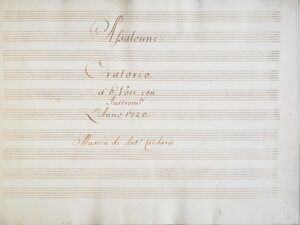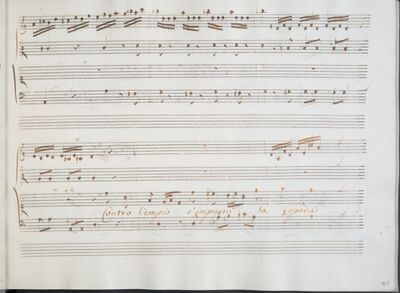Difference between revisions of "Contro l'empio s'impugni la spada"
| (12 intermediate revisions by the same user not shown) | |||
| Line 57: | Line 57: | ||
}} | }} | ||
{{lang|it|Contro l'empio s'impugni la spada}} is an aria from the oratorio ''Assalonne'' (Engl.: Absalom, Ger: Abschalom or Absalom) is an oratorio by [[Antonio Caldara]] with a libretto by [[Giacomo Antonio Bergamori]]. It premiered in 1720, at the {{lang|de|Hofkapelle}} (court chapel) in Vienna<ref name="IMSLP"/>. | {{lang|it|Contro l'empio s'impugni la spada}} is an aria from the oratorio ''Assalonne'' (Engl.: Absalom, Ger: Abschalom or Absalom) is an oratorio by [[Antonio Caldara]] with a libretto by [[Giacomo Antonio Bergamori]]. It premiered in 1720, at the {{lang|de|Hofkapelle}} (court chapel) in Vienna<ref name="IMSLP"/>. | ||
In the role of Joabbe (Joab), Joanni is indicated. (Whether this is the name of a castrato is unclear.) | |||
{| class="wikitable sortable" style="zebra | {| class="wikitable sortable" style="zebra | ||
! Year | ! Year | ||
| Line 71: | Line 72: | ||
<!-- Place <div class="wrapperlibretti"> on top of the libretto and close it in the end.--> | <!-- Place <div class="wrapperlibretti"> on top of the libretto and close it in the end.--> | ||
<!-- Use Template:Libretti, not custom HTML on the page.--> | <!-- Use Template:Libretti, not custom HTML on the page.--> | ||
<div class=" | <div class="eighteenth"> | ||
{{Song header <!-- use of this template automatically includes Template:Custom/songinfo.css --> | {{Song header <!-- use of this template automatically includes Template:Custom/songinfo.css --> | ||
| title = | | title = Contro l'empio s'impugni la spada | ||
| english-title = | | english-title = Against the wicked take up the sword! | ||
| composer = | | composer = [[Antonio Caldara]] | ||
| lyricist = | | lyricist = [[Giacomo Antonio Bergamori]] | ||
| work = | | work = [[Assalonne]] | ||
| catalogue = | | catalogue = | ||
| role = | | role = [[Ioabbe]] | ||
}} | }} | ||
</div> | </div> | ||
| Line 87: | Line 88: | ||
{{Libretti | {{Libretti | ||
| country =Italy | | country =Italy | ||
| language-note = | | language-note =Modernized Italian | ||
| libretto-text =<poem>{{ | | libretto-text =<poem>{{lang|it|Contro l'empio s'impugni la spada! | ||
Non è figlio chi fido non è. | |||
Egli cada! | |||
Egli si atterri! | |||
Preda resti di ceppi, e di ferri, | |||
Che un fellone non merta mercé.}}</poem> | |||
}}{{Libretti | |||
| country =Italy | |||
| language-note =Ancient Italian | |||
| libretto-text =<poem>{{lang|it|Contro l'empio s'impugni la spada. | |||
Non è figlio chi fido non è. | Non è figlio chi fido non è. | ||
| Line 94: | Line 105: | ||
Egli si atterri : | Egli si atterri : | ||
Preda resti di ceppi, e di ferri; | Preda resti di ceppi, e di ferri; | ||
Che un fellone non merta mercè.}}</poem><div class="footnotes"><poem>Source: Libretto, 1920<ref name="Libretto"/></poem></div>}} | Che un fellone non merta mercè.}}</poem><div class="footnotes"><poem>Source: Libretto, 1920<ref name="Libretto"/></poem></div>}}{{Libretti | ||
| country =United Kingdom | |||
{{Libretti | |||
| country = | |||
| language-note = | | language-note = | ||
| libretto-text = | | libretto-text =<poem>Against the wicked take up the sword! | ||
A disloyal son is no longer a son. | |||
He shall fall! | |||
He shall be struck down! | |||
}} | He shall be held captive in shackles and chains, | ||
For who breaks allegiance does not deserve mercy.<ref name="English"/></poem><div class="footnotes"><poem></poem></div> | |||
}} | |||
</div> | </div> | ||
{{Clear|left}} | {{Clear|left}} | ||
==Sources== | ==Sources== | ||
[[File:Incipit of Contro l'empio.jpg|400px|thumb|alt=Incipit of "Contro l'empio s'impugni la spada"|Incipit of "Contro l'empio s'impugni la spada"]] | |||
*Free Score at the IMSLP: | *Free Score at the IMSLP: | ||
:Manuscript, n.d.(ca.1720). | :Manuscript, n.d.(ca.1720). | ||
| Line 162: | Line 175: | ||
}} | }} | ||
</ref> | </ref> | ||
<ref name="English">English translation by Birikein & FR, 2021</ref> | |||
<ref name="OpeningNight"> | <ref name="OpeningNight"> | ||
{{cite web | {{cite web | ||
| Line 175: | Line 189: | ||
|archive-date={{date|2021-10-22|MDY}} | |archive-date={{date|2021-10-22|MDY}} | ||
|quote=}}</ref> | |quote=}}</ref> | ||
<ref name="Libretto"> | <ref name="Libretto"> | ||
{{cite web | {{cite web | ||
| Line 201: | Line 203: | ||
|archive-date={{date|2021-10-22|MDY}} | |archive-date={{date|2021-10-22|MDY}} | ||
|quote=}}</ref> | |quote=}}</ref> | ||
}} | |||
{{cite book | |||
==Further reading== | |||
*{{cite book | |||
|last=Kirkendale | |last=Kirkendale | ||
|first=Ursula | |first=Ursula | ||
| Line 213: | Line 217: | ||
|page= <!-- or pages= --> | |page= <!-- or pages= --> | ||
|isbn= | |isbn= | ||
}} | }} | ||
*{{cite web | |||
|url=https://en.wikipedia.org/wiki/Joab | |||
|archive-url=https://archive.ph/ikv9N | |||
|title=Joab | |||
|last= | |||
|first= | |||
|date= | |||
|website=Wikipedia | |||
|publisher= | |||
|access-date={{date|2021-10-22|MDY}} | |||
|archive-date={{date|2021-10-22|MDY}} | |||
|quote=}} | |||
[[Category:Music]] | [[Category:Music]] | ||
[[Category:18th-century music]] | [[Category:18th-century music]] | ||
[[Category:sacred]]<!-- secular or sacred --> | [[Category:sacred]]<!-- secular or sacred --> | ||
Latest revision as of 20:17, 28 October 2021
| Assalonne | |
|---|---|
| by Antonio Caldara | |
 First page of Assalonne, 1720[1] | |
| English | Absalom |
| Other name | Assalone[2] |
| Libretto | Giacomo Antonio Bergamori |
| Premiere | |
| Date | 23 February 1720[1][2] |
| Location | Vienna: Hofkapelle |
Contro l'empio s'impugni la spada is an aria from the oratorio Assalonne (Engl.: Absalom, Ger: Abschalom or Absalom) is an oratorio by Antonio Caldara with a libretto by Giacomo Antonio Bergamori. It premiered in 1720, at the Hofkapelle (court chapel) in Vienna[1].
In the role of Joabbe (Joab), Joanni is indicated. (Whether this is the name of a castrato is unclear.)
| Year | Album |
|---|---|
| 2020 | La Vanità del Mondo (Album) |
Libretto
from Assalonne
Antonio Caldara (music), Giacomo Antonio Bergamori (words)
Modernized Italian | |
Contro l'empio s'impugni la spada! | |
Ancient Italian | |
Contro l'empio s'impugni la spada. Source: Libretto, 1920[3] | |
Against the wicked take up the sword! | |
Sources
- Free Score at the IMSLP:
- Manuscript, n.d.(ca.1720).
- Copyist of Vienna
- Public Domain
- Österreichische Nationalbibliothek, Vienna (A-Wn): Mus.Hs.17058
- "Assalonne (Caldara, Antonio)". IMSLP. Österreichische Nationalbibliothek, Vienna. 1720. Retrieved October 21, 2021.[1]
- Free Libretto
- Assalonne / Oratorio / Cantato / Nell'Augustissima Capella
- Della Sac. Cesarea, e Catt. Real / Maesta' / di / Carlo VI.
- Imperador / de' Romani / Sempre Augusto / L'Anno M. DCC.XX
- Musica del Sig. Antonio Caldara, Vice-Maestro di Cappella di S. M. Ces. e Catt.
- Vienna d'Austria / Appresso Gio. Van Ghelen, Stampatore d Corte di S. M. C. e C.
- Caldara, Antonio (1720). "Assalone". Google Books. Gio. Van Ghelen, Stampatore d Corte di S. M. C. e C. Archived from the original on October 22, 2021. Retrieved October 22, 2021.[3]
References
- ↑ 1.0 1.1 1.2 1.3 "Assalonne (Caldara, Antonio)". IMSLP. Österreichische Nationalbibliothek, Vienna. 1720. Retrieved October 1, 2021.
- ↑ 2.0 2.1 Caldara, Antonio. "Assalone". OpeningNight. Stanford. Archived from the original on October 22, 2021. Retrieved October 22, 2021.
- ↑ 3.0 3.1 Caldara, Antonio (1720). "Assalone". Google Books. Gio. Van Ghelen, Stampatore d Corte di S. M. C. e C. Archived from the original on October 22, 2021. Retrieved October 22, 2021.
- ↑ English translation by Birikein & FR, 2021
Further reading
- Kirkendale, Ursula (1966). Antonio Caldara, Sein Leben und seine venezianisch-römischen Oratorien. Böhlau, Universität Wien. Musikwissenschaftliches Institut.
- "Joab". Wikipedia. Archived from the original on October 22, 2021. Retrieved October 22, 2021.
